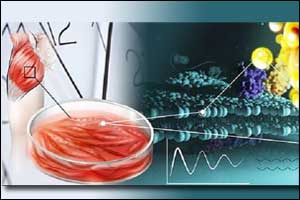- Home
- Editorial
- News
- Practice Guidelines
- Anesthesiology Guidelines
- Cancer Guidelines
- Cardiac Sciences Guidelines
- Critical Care Guidelines
- Dentistry Guidelines
- Dermatology Guidelines
- Diabetes and Endo Guidelines
- Diagnostics Guidelines
- ENT Guidelines
- Featured Practice Guidelines
- Gastroenterology Guidelines
- Geriatrics Guidelines
- Medicine Guidelines
- Nephrology Guidelines
- Neurosciences Guidelines
- Obs and Gynae Guidelines
- Ophthalmology Guidelines
- Orthopaedics Guidelines
- Paediatrics Guidelines
- Psychiatry Guidelines
- Pulmonology Guidelines
- Radiology Guidelines
- Surgery Guidelines
- Urology Guidelines
Our muscles measure the time of day

Biological clocks are ticking everywhere throughout our body. They trigger the release of the hormone melatonin during sleep, favour the secretion of digestive enzymes at lunchtime or keep us awake at the busiest moments of the day. A «master clock» in the brain synchronises all the subsidiary ones in various organs. Researchers from the University of Geneva (UNIGE), Switzerland, together with their colleagues from the University of Bath, the Université Claude Bernard in Lyon, EPFL, the University of Surrey, and the Nestlé Institute of Health Sciences, have found that such a circadian clock is at work in our muscles. Their research, funded by the Swiss National Science Foundation (SNSF), shows that perturbations of this machinery might be important for type 2 diabetes development. Their work has just been published in the magazine PNAS.
The researchers discovered that levels of the various types of fat (lipids) contained in our muscle cells vary during the day, sometimes favouring one kind of lipid over another. Could a biological clock be at play? The international team has tested the hypothesis with volunteer subjects. They synchronised every subject's master clock by asking them to adhere to a daily eating and sleeping routine one week prior to the experiment. Every four hours, researchers would take a very small sample of thigh muscle tissue and analyse its lipid composition.
The team observed a clear correlation between the muscle cell's lipid composition and the time of day, explains Howard Riezman from the Biochemistry Department of the Faculty of Sciences, UNIGE, who codirected the study in Geneva with colleague Charna Dibner, from the Department of Internal Medicine Specialties, from the Faculty of Medicine, UNIGE. "As the combination of lipids varied substantially from one individual to another, we needed further evidence to corroborate these findings," he explains.
In a second step, the researchers switched to an in-vitro experiment. They cultivated human muscle cells and artificially synchronised them in the absence of a master clock, using a signal molecule normally secreted in the body. The researchers observed a periodic variation in the cell's lipid composition, similar to what they noticed in human subjects. But when they disrupted the clock mechanism by inhibiting the responsible genes, the periodically changing variations in the lipids were mostly lost.
Diabetes and sleep disorders are linked
"We have clearly shown that this variation of lipid types in our muscles is due to our circadian rhythm," explains first author Ursula Loizides-Mangold, from the Department of Internal Medicine Specialties, from the Faculty of Medicine, UNIGE. "But the main question is still to be answered: what is this mechanism for?" Riezman thinks that the biological clock in the muscle, with its impact on the lipids, could help in regulating the cells' sensitivity to insulin. Indeed, lipids - being a component of the cell membrane - influence the molecules' ability to travel into and out of the muscle cells. Changes in its composition could tune the muscle's sensitivity to the hormone as well as its ability to take in blood sugar.
A low sensitivity of the muscle to insulin leads to a condition called insulin resistance, which is known to be a cause of type 2 diabetes. "Studies strongly suggest a link between circadian clocks, insulin resistance and diabetes development," explains Charna Dibner, the co-director of the study. "If we establish a link between circadian mechanisms and type 2 diabetes via lipid metabolism, this could have important therapeutic implications. Thanks to our new tools for studying human muscle cellular clocks in vitro, we now have the possibility to investigate this hypothesis in our next study."
You can read the full Article by clicking on the link :

Disclaimer: This site is primarily intended for healthcare professionals. Any content/information on this website does not replace the advice of medical and/or health professionals and should not be construed as medical/diagnostic advice/endorsement or prescription. Use of this site is subject to our terms of use, privacy policy, advertisement policy. © 2020 Minerva Medical Treatment Pvt Ltd